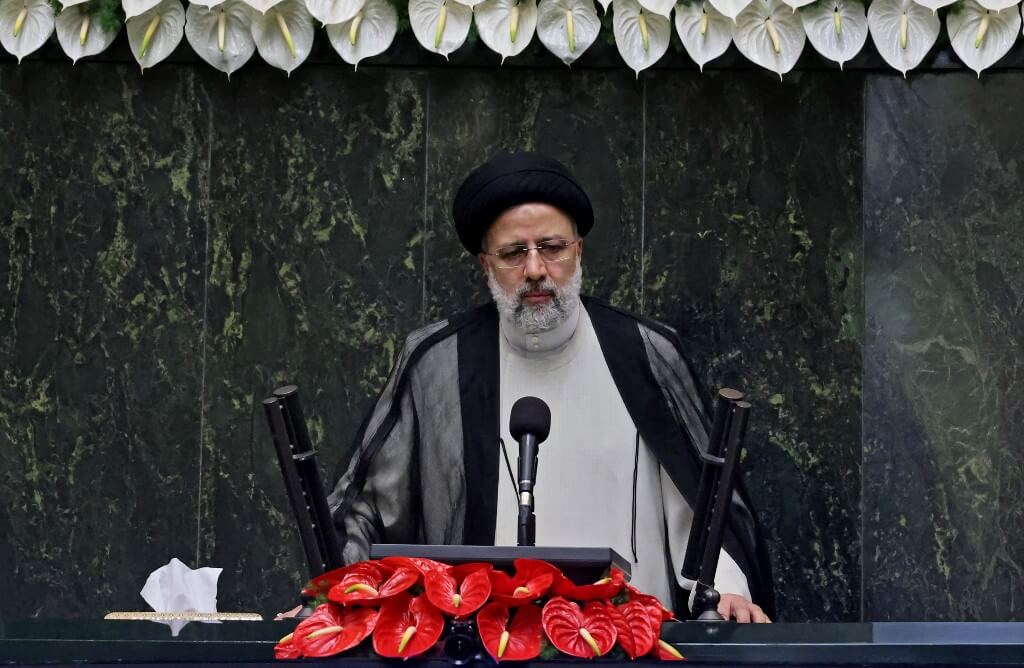Former judiciary chief and Islamic cleric Ebrahim Raisi was sworn in as the Islamic Republic of Iran’s eighth President on Thursday during a ceremony in the Parliament. The inauguration comes as the country is facing increasing pressure from the West to restart nuclear negotiations. While vowing to resist pressure, Raisi said his administration would support diplomacy.
Calling himself the “people’s servant”, Raisi said his election was the manifestation of “the will of the people.” He mentioned that it was important to resist the “oppressive powers” on the one hand and commit to “extensive interaction with the whole world” on the other. “We are the true defenders of human rights, and we do not accept silence against oppression and crime and the violation of the rights of innocent and defenceless human beings,” the new President stated.
He also pointed out that the Iranian nuclear programme is peaceful, and Iran does not aim to establish a nuclear weapon. “The Islamic Republic, according to the fatwa of the Supreme Leader of the Islamic Revolution, prohibits nuclear weapons, and such weapons have no place in the defence strategy of the Islamic Republic,” Raisi said.
Moreover, Raisi criticised the Western sanctions on Iran and said that they would not stop Iranians pursuing their “legal” rights. “Sanctions against Iran must be lifted, and we will support any diplomatic plan that achieves this goal,” he stressed. “Diplomacy must strengthen the bonds among nations of the region and strengthen their common grounds in the fields of economy, culture, science and technology,” he added.
However, the way forward for Raisi will not be easy. He will inherit an economy in tatters due to the crippling sanctions and will have to manage the country’s worsening COVID-19 crisis besides dealing with widespread public anger due to water shortages. At present, Iran faces one of its worst droughts and a range of external challenges, including Western sanctions and pressure to restart nuclear talks and an increasing rivalry with Israel.
Reacting to Raisi’s appointment as Iran’s President, the United States (US) urged him to return to the negotiating table for nuclear talks as soon as possible. “We hope that Iran seizes the opportunity now to advance diplomatic solutions and the diplomatic solutions that are before all of us,” US State Department spokesperson Ned Price said on Thursday. Price stressed that the US is “prepared to return to Vienna to resume negotiations” as it is in its national interest. “The opportunity to achieve a mutual return to compliance with the JCPOA won’t last forever,” he warned.
Since April, Iranian officials have held intense negotiations with their counterparts from Britain, France, Germany, Russia, and China in Vienna to restore the 2015 nuclear deal. While diplomats have expressed satisfaction with the discussions so far, the sixth round of talks ended on June 20 with no sign of when the subsequent negotiations would resume. Last month, Iran said that it was not ready to resume talks until Raisi takes office.
The harshest reaction to Raisi’s swearing-in was from Israel. The Israeli Foreign Ministry called Raisi an “extremist committed to Iran’s regional terrorism [and] said that he visited “Hezbollah terrorists in Syria & Lebanon” in 2018.
The Ministry also accused Raisi of antisemitism and promoting “antisemitic work which demonises Jews.” Gilad Erdan, Israel’s Ambassador to the US and the United Nations, tweeted that Raisi had “blood on his hands”, referring to his role in the mass execution of around 30,000 Iranian political prisoners in 1988. Erdan added that as President, Raisi “will only create more violence and instability.”
Tensions between Iran and Israel skyrocketed earlier this week when Israel blamed Iran for orchestrating a drone attack on an Israeli-linked oil tanker off the coast of Oman. The Iran-Israel proxy war has recently taken a maritime dimension, with both sides accusing each other of carrying out covert attacks against their vessels.
Human rights groups, including Amnesty International, have criticised Raisi and called for a criminal investigation for his role in the 1988 massacre. “That Ebrahim Raisi has risen to the presidency instead of being investigated for the crimes against humanity of murder, enforced disappearance and torture, is a grim reminder that impunity reigns supreme in Iran,” Amnesty’s Secretary-General, Agnès Callamard, said after the Iranian Presidential elections in June.
Raisi was elected President with 49% votes, the lowest in the history of the Islamic Republic. He will replace Hassan Rouhani and is believed to have the strong backing of Iranian Supreme Leader Ayatollah Ali Khamenei, who considers Raisi a potential candidate to replace him.
Ebrahim Raisi Sworn in as Iran’s Eighth President, Says He Will Support Diplomacy
Ebrahim Raisi was sworn in as Iran’s eighth President on Thursday during a ceremony in the Parliament. While vowing to resist pressure, Raisi said his administration would support diplomacy.
August 6, 2021

Iran's eighth President, Ebrahim Raisi. SOURCE: REUTERS
